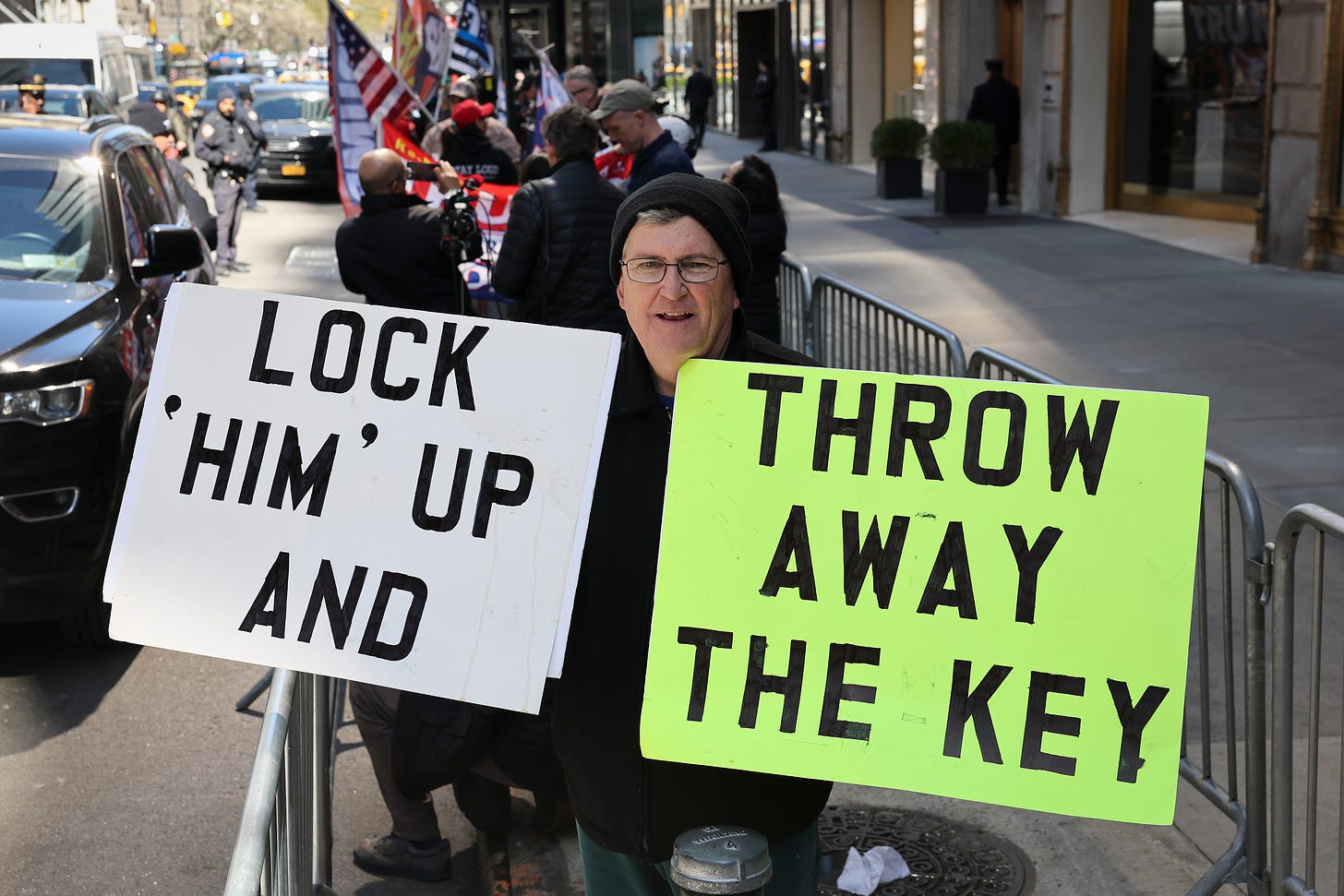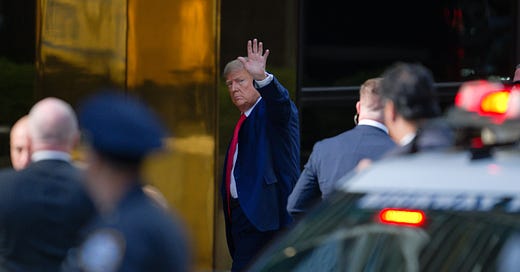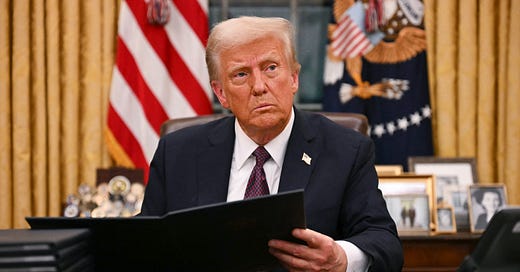The Free Press

For seven years, the progressive resistance has fantasized about Donald Trump’s indictment, conviction, and incarceration.
First, there was his alleged collusion with Russia, which dominated the better part of 2017 and 2018, and tapered off in early 2019.
Then, just as Russiagate was winding down, along came all the talk about his obstruction of the investigation into that alleged collusion, followed by his phone call with Ukraine’s president, during which Trump asked Volodymyr Zelensky to announce an investigation into Hunter Biden. This became grist for his first impeachment in late 2019.
That didn’t work: the Senate acquitted Trump in February 2020. So the resistance needed to find something else. That would be the theory that Trump was sabotaging the U.S. postal service to hinder mail-in voting during the 2020 election.
If he had hindered mail-in voting—a charge for which no evidence ever materialized—he did a poor job of it. Trump lost the election. Then he falsely claimed it was stolen, and his supporters rioted on January 6, 2021, at the Capitol. That was grist for his second impeachment. Again, the Senate did not convict him.
But the beat went on.
Next came the FBI’s raid of Mar-a-Lago on account of the classified documents Trump mishandled. Neal Katyal, the former acting solicitor general, went on television and warned of prison time. But so far, that hasn’t borne much fruit. If anything, it’s embarrassed President Biden, who, we’ve learned, has his own mishandled classified documents problem.
All of these narratives have placed Democrats, progressive lawyers, MSNBC pundits, and the retired wine moms who can’t get enough in a cycle of perpetual anticipation and inevitable frustration. Every promising scandal has fizzled.
This is not to say that Trump was innocent in all of these cases: His complicity in the events of January 6 is apparent and shameful.
The point is that the longed-for final scene in the Trump drama, where the bad guy gets what’s coming, has never come. None of these investigations or allegations has resulted in a mug shot of Trump in handcuffs and an orange jumpsuit. Not even getting kicked off Facebook and Twitter seems to have done much good: less than two years after that happened, both accounts were restored. Nothing stuck with Teflon Don!
Until now.
Today, the resistance will get what it’s been craving. Today, the 45th president will appear in a Manhattan courtroom for his arraignment, and the borough’s progressive district attorney, Alvin Bragg, will unseal his criminal indictment.

If that indictment is what has been widely reported, then it will be hard to persuade anyone outside of the progressive bubble that it was worth upending 230 years of American norms and customs to charge—for the first time—a former president with a felony.
The indictment will revolve around hush money payments paid at the end of the 2016 election cycle to adult entertainer and Trump fling Stormy Daniels and, possibly, a former Playboy Playmate, Karen McDougal. Bragg revived what was known inside the Manhattan District Attorney’s office as the “zombie investigation” into the hush money payments. Bragg’s predecessor, Cyrus Vance, declined to seek an indictment on this matter.
The theory of the case goes as follows. Trump made the hush money payments through his fixer, Michael Cohen, and reported the expense as “legal fees.” In fact, Bragg will allege, these were in-kind donations from Trump to his own presidential campaign. This distinction is important because New York state law deems the falsification of business records to be a misdemeanor unless that falsification is meant to conceal another crime. In this case, the documented fraud was perpetrated to conceal a violation of campaign finance law.
If this is, in fact, Bragg’s case against Trump, then it’s paper-thin. Many campaign finance law experts say it’s unclear whether hush money would be an in-kind contribution to a political campaign, since Trump himself has said he made the payments to spare his family from embarrassment—not to win the 2016 election.
What’s more, President Biden’s own Justice Department, which would be the appropriate venue to prosecute this case, has declined to do so—presumably, because there’s not much there there.
Finally, reporting violations of campaign finance law are almost never prosecuted as felonies. Recall that last year, the Democratic National Committee and Hillary Clinton’s campaign were fined for a similar violation. They had obscured the reporting of payments to a former British spy for his work on a dossier that falsely alleged Trump had colluded with Russia. Instead of reporting the expense as dirt-digging or scandal-mongering, the campaign claimed the fees were for “legal services” and “legal and compliance consulting.”
One possible explanation for Bragg’s decision to bring this case is he was embarrassed early in the year when a former prosecutor from his office published a book alleging the new district attorney had shut down an investigation into Trump’s inflating the value of his properties in loan applications to banks.
Another explanation is Bragg grasps that, even if he loses his case against Trump, there will always be a lot of voters, activists, and other professional Democrats who don’t care what crime Trump is alleged to have committed, so long as he is indicted for something—anything. This is the series finale the Trump resistance has dreamed of since 2017. What does it matter if the actual case resembles a Rube Goldberg contraption and is predicated on a novel legal theory?
In other words, Bragg will still win politically even if he loses in court.
And that is the biggest problem with today’s arraignment. The district attorney’s political interests do not align with those of the republic. He wants to satisfy the most extreme partisans on his own side. It’s a similar problem that elected officials from Republican states face. So don’t be surprised when an ambitious Republican prosecutor from, say, Texas or South Carolina indicts Hunter Biden on a similarly thin legal pretext. Bragg has set a new precedent in American politics, and we should expect Republicans to take advantage of the new standards he’s just created. Indeed, Republicans who do not take advantage of the new rules will be accused of being weak.
All of this raises a question—not just for Bragg, but for the Democratic Party, the online resistance, and the media ecosystem that seems to exist simply to stoke outrage about Donald Trump for its overstimulated, progressive base: Is it worth it? Is the catharsis of seeing Trump indicted worth the damage a politicized prosecution of the former president will do? Because indicting Trump in this way, at this time, is an in-kind donation to his own presidential primary campaign. If the latest polling is correct, then Trump’s approval ratings have ticked up since the announcement of his indictment.
Many of Trump’s supporters have for years thought that he’s the victim of a series of witch hunts and this prosecution is just the latest in a series of injustices. That is not entirely true. The District Attorney for Fulton County, Georgia, for example, is conducting a serious investigation into Trump’s strong-arming of state officials in 2020 and 2021 to find him votes in the election that he lost. Good luck convincing Republicans and independents that the results of that investigation are legitimate after today.
Trump justifies his own flouting of rules because he says the system is rigged against him. Why is Alvin Bragg trying to prove his point?
Eli Lake is a columnist at the New York Sun. Follow him on Twitter @EliLake.
For a different perspective on Bragg, read Harry Litman in the L.A. Times making the case that “Alvin Bragg has taken toward accountability for a man who has shown nothing but contempt for the rule of law.”
Meantime, today on Honestly, Bari sits down with New York City Mayor Eric Adams to talk about crime, public schools, and why he says Gotham will never be the next San Francisco.
Listen here:
Last but not least: if you want to support more independent takes on the day’s news, become a Free Press subscriber today:
















Trump’s indictment is just another boost to further polarization of America, more and more republicans see this just another way Democrats are weaponizing justice system to deal with opposition (honestly I cant blame them), and when this very weak indictment fails, many Democrats will claim that it is because Republicans have packed the courts.
No mater what happens now, both sides will be unhappy with outcome. Question is, can we survive as country if we continue on this path, or are we already at point of no return.
I honestly hope that this will all end, not with death of USA, but with death of corrupt DNC and RNC, both parties are rotten to the core (DNC more than RNC), and sooner we get rid of them, the better.
I would go even further and suggest that this whole farce is a calculated plan to ensure that Trump is the nominee, because the Biden/Democrat Party knows he is the only candidate they can beat in the general election. Yes, I know that’s a bit of a rabbit hole, but what else makes sense?